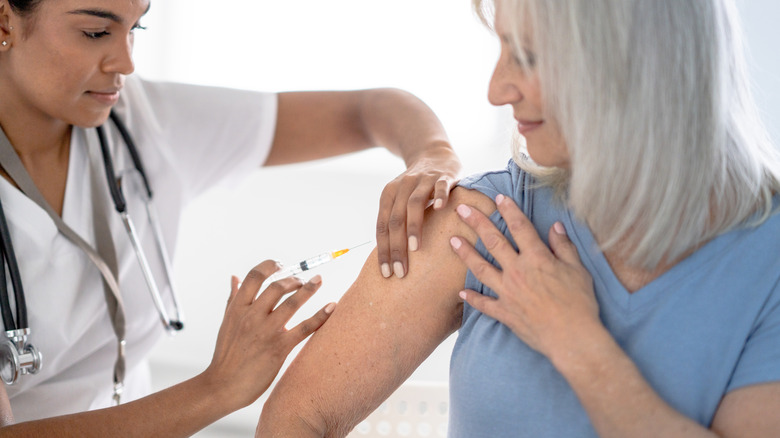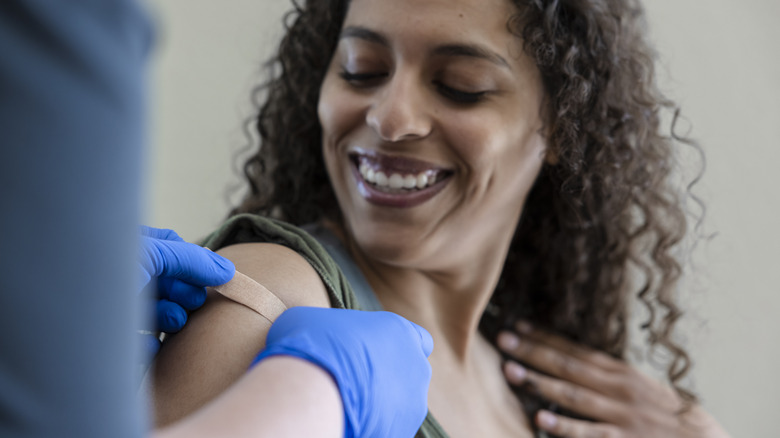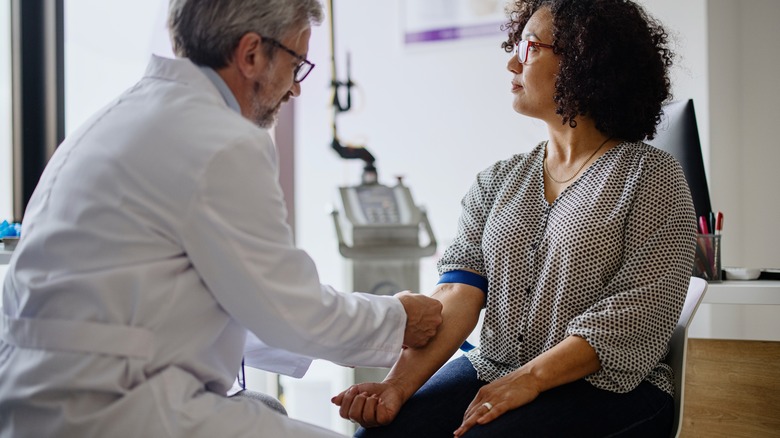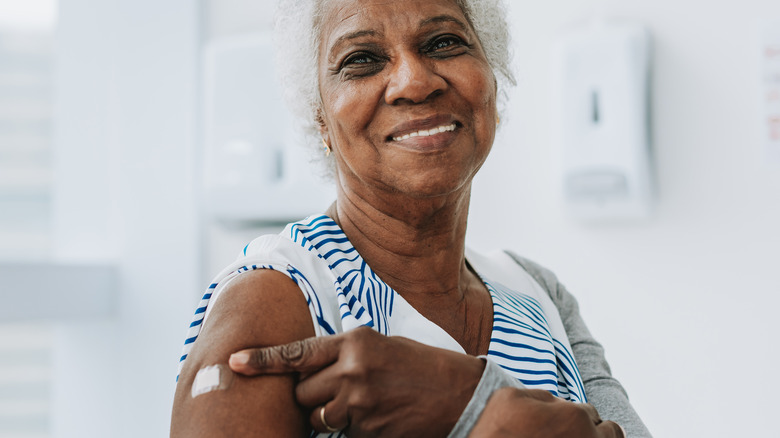Simple Tricks To Cope With Needle Fear The Next Time You Visit The Doctor
For many, needles aren't just medical tools; they're triggers for intense fear and anxiety. Fear of needles, known as trypanophobia, is very common, affecting up to 2 in 3 children and 1 in 4 adults, according to the Centers for Disease Control and Prevention (CDC). If you're among them, the sight or thought of a needle can cause a feeling of dread and panic so strong that you might avoid getting essential medical care.
A mix of things drive this fear, ranging from your anxiety about pain and injury to negative past experiences. Whether rooted in a specific incident or a general feeling of unease with medical settings, the fear can have a real impact on your wellbeing, mentally and physically.
Phobias can be overcome, but it takes time. Fortunately, various coping mechanisms and desensitization techniques can help you manage your anxiety and reclaim control in medical situations. Things like breath meditation, distraction, controlling stress, and simply communicating with your medical team can make your experience much more bearable. There's nothing simple about your feelings around needles, but there are some simple steps you can take to conquer your fear.
Communicate with your healthcare team
You're not alone with your needle fears. So many people share the phobia that healthcare providers are well aware of the challenges people face. Therefore, you should feel completely comfortable talking to your doctor about your fear. This is an important step toward receiving comfortable and anxiety-free medical care. You don't have to wait until it's time for you to have a vaccination or a blood draw. Talk to them about it at your annual physical, or even make a separate appointment to discuss your fears.
It's helpful to be very straightforward about your fear. Being honest about your feelings allows your doctor to understand your situation fully and give you the support you need. If previous medical procedures have contributed to your fear, share these experiences with your doctor. This information can help them tailor their approach to your care.
Many healthcare providers can offer accommodations to make procedures involving needles less stressful. This could include having a more private setting or ensuring you're lying down if you often feel faint during procedures involving needles. You can also ask about alternatives. Depending on the situation, there might be alternatives to traditional needles, such as smaller-gauge needles, which are thinner and often less painful, or even needle-free delivery systems for certain medications (via the CDC).
Minimize stress before your appointment
You already know that your appointment is going to be stressful. Reducing some of your stress before your appointment happens can help you feel better when it actually comes time to face your fear. The evening before, eat a nutritious meal and get a good night's sleep. Research shows that diet and sleep quality are closely linked with mental health (per Nutrients). If you're having trouble drifting off, a warm bath, herbal tea, relaxing music, and deep breathing can help.
The next morning, skip the coffee or energy drinks. Caffeine can exacerbate anxiety symptoms, especially when you drink a lot of it. Leave plenty of time to get to your appointment, so you don't have to rush. Stressing about running late for your appointment when there's unexpected traffic will only make things worse. In the car, listen to some relaxing music or a funny podcast. Avoid the news, loud music, or anything else that heightens your stress levels.
Even though you dread being there, arrive at the doctor's office with plenty of time to spare. Sit quietly and try taking some deep breaths until your name is called.
Distract yourself
Fear comes from inside your mind. When you're sitting in the chair about to have your blood drawn, the thoughts created in your head fuel your fear. If you can distract yourself from what's happening, then you can tamp down some of those fearful thoughts. Doing something you enjoy while being pricked can also help you associate shots and blood draws with pleasurable activities. Of course, what you can do is limited by only being able to use one arm.
Bring headphones with you and listen to your favorite music or podcast. You can also have something set up to watch on your phone during the procedure, which will keep your brain and your eyes busy. Choose something funny, like your favorite comedian, or something cute, such as puppy videos. You can also scroll through your own photo and video gallery to look back on fun memories, or look at pictures and videos of your loved ones.
If it won't interfere with your test, you might try distracting yourself with something sweet or sour, such as hard candy. Some research shows that chewing gum can reduce stress and anxiety (via Stress and Health: Journal of the International Society for the Investigation of Stress).
Bring support
The importance of a support system in dealing with fear and anxiety can't be understated. Research has shown that having a supportive person with you during a fearful situation can reduce physiological markers of stress, including heart rate, blood pressure, and the stress hormone cortisol (per Psychiatry).
Bring a friend or family member with you to provide both comfort and distraction. Have your loved one drive you to and from your appointment so you don't have to deal with the stress of driving and finding parking. In most cases, there shouldn't be any problem with your companion coming into the room where you'll be having the shot or blood draw. But it's a good idea to ask your doctor or call the medical facility or clinic beforehand to make sure. When you do ask, be open and honest and explain that this is important to you because of your anxiety.
During the procedure, just talking with a friend or family member can help. Your companion can also hold your hand — or even squeeze it to distract you. Or, you could play a game, such as "I'm going on a picnic," tell silly jokes, or recall fun memories.
Whatever you do, choose to bring someone with you who makes you feel calm and at ease, rather than someone who might possibly make you feel more anxious or uncomfortable.
Breathe deeply
When you are feeling fearful or anxious, your body's natural "fight or flight" response is triggered, leading to physical symptoms such as increased heart rate, rapid breathing, and muscle tension (via StatPearls). Deep breathing exercises counteract these responses by activating the body's parasympathetic nervous system, often referred to as the "rest and digest" system, which promotes a state of calmness and relaxation.
Practicing deep breathing involves slow, deliberate inhalations through the nose, allowing the lungs to fully expand, followed by slow, controlled exhalations. This process brings more fresh oxygen to the brain and turns on the parasympathetic nervous system, which helps reduce stress and anxiety levels. Another benefit is that focusing on the rhythm of your breath distracts you, turning your attention away from anxious thoughts or fears and reducing the negative thinking that can stoke your needle fear.
You can do this breathing practice any time you feel your fear rising up. It can be especially helpful to spend some time deep breathing the night before your appointment, the morning of, while you're in the waiting room, and during your shot or blood draw. You can try different variations, such as box breathing. This involves inhaling slowly for four counts, holding your breath for four counts, exhaling for four counts, and then holding your breath again for four counts. Continue to repeat this cycle.
Use guided imagery
Guided imagery is an anxiety-reduction technique that can help you both during the fearful event and leading up to it. Before your appointment, you can practice guided imagery to create positive mental images of overcoming or calmly facing your fear. For example, you can visualize yourself going to your appointment feeling confident and relaxed. Imagine yourself in the room with the doctor or nurse, feeling safe, warm, and secure. Imagine the procedure going smoothly and quickly, and you leaving feeling calm and happy. Rather than ruminating about your worries, replacing them with these positive thoughts can help slowly reframe your negative feelings about needles (via SelfPause).
While you're at your appointment, you can use guided imagery to distract your mind from negative thoughts. You can find guided imagery downloads online and listen to them on your headphones. You can also do it on your own by closing your eyes and creating a vivid image of a place you love. Research shows that nature-based guided imagery may be particularly effective for reducing anxiety (per Frontiers in Psychology). Picture being at the beach or in the mountains, either enjoying solitude or with someone you love. Think about how you feel while you're there, imagining the sensations of the sea or mountain air, playing with your dog on the beach, or hiking with your significant other.
Ask for comfort measures
If the physical sensations of needles are what scare you the most, you don't have to suffer in silence. There are several methods you and your healthcare provider can use to make the experience more comfortable. This is a good reason to talk to your doctor ahead of time so that you know your options and can be prepared.
One of those options includes numbing the area. A spray or lotion containing lidocaine can be applied 30 to 60 minutes before the procedure. Icing the area just before can also help. It might not completely take away the pain, but it can reduce it. Another option is using a buzzer device. When held near the injection site, it can momentarily distract the brain and reduce pain sensation (via Medical University of South Carolina).
If your fear is so strong that it prevents you from getting crucial medical care, your doctor might prescribe short-acting anxiety medications like benzodiazapenes, including Xanax and Valium. These work by increasing the effects of GABA, a neurotransmitter in the brain associated with relaxation (per Neuroscience Letters).
Think about the benefits
Whether you have to get a vaccine, a blood test, an IV put in, or any other kind of medical care involving needles — understanding how they benefit your health can give you the motivation to overcome your fear.
Vaccines help prevent infectious diseases, some of which can be life-threatening. They stimulate the immune system to produce antibodies against specific pathogens without causing the disease itself. This protects you against getting sick should you come into contact with the pathogen in the future. It also helps reduce the spread of contagious diseases within your community. Vaccines have eradicated or significantly reduced many infectious diseases and extended life expectancy.
Blood tests are important tools for diagnosing and monitoring health conditions. They can tell you and your doctor how your body is functioning, and detect abnormalities such as infections, anemia, and diabetes early on. Routine blood tests can also identify risk factors for diseases, such as high cholesterol or blood sugar levels. This early detection makes treatment and management more effective, potentially preventing complications and improving outcomes. Blood tests also monitor the progress of ongoing treatments to see how they're working.
If you're hospitalized and need to have an IV, this enables the delivery of fluids, medications, or nutrients directly into your bloodstream. It allows for rapid absorption and immediate effects, which can be very helpful when you're sick or need emergency treatment.
Seek professional support
Working with a mental health professional can help you prepare for your procedure and gradually reduce your fear over time. For some, needle phobia is linked to past traumatic experiences or other underlying psychological issues. In these cases, therapists can provide a safe space to process these experiences, offering support and strategies to overcome the trauma associated with needles.
One of the most common methods for treating phobias is Cognitive Behavioral Therapy (CBT), which focuses on identifying and challenging the negative thought patterns and beliefs that fuel your needle fear. Through CBT, you can learn to reframe your thinking about needles and medical procedures, gradually reducing the anxiety associated with them.
Exposure therapy, a component of CBT, is another effective technique where you are gradually exposed to needles or the concept of injections in a controlled and safe environment. This method helps desensitize you to your fear. Therapists may start with low-intimidation tasks, such as looking at pictures of needles, and progressively move towards more direct exposure, like holding a syringe or being present in a medical setting.
Therapists can also teach relaxation and coping techniques, such as deep breathing, progressive muscle relaxation, and visualization, to help you manage your anxiety during medical appointments.
Seek peer support
Remember that needle fear is common. That means there are a lot of other people out there who feel just like you do. Often, connecting with them, sharing experiences, and getting and giving support can be an important way to overcome your fear.
One of the key benefits of participating in a support group is the exchange of coping strategies. Members share their personal experiences with various techniques that have helped them face or manage their fear of needles, such as relaxation methods, distraction tactics, or gradual exposure techniques. Learning about these strategies from peers who have successfully navigated similar challenges can inspire confidence and provide practical tools for you to apply in your own life.
Support groups also create a positive feedback loop of encouragement and success. Hearing stories of progress and overcoming fear from other members can motivate you to confront your own fear. This positive reinforcement can strengthen your belief in your ability to manage your fear, reducing the sense of isolation and helplessness that often accompanies it.
Additionally, your peers might be able to make recommendations for therapists who specialize in phobias or provide information about treatment options that you may not have considered. The support and encouragement can also make the idea of seeking professional help less daunting.
Reward yourself
You did it! You got yourself to your appointment and got through it like a champ. You deserve a reward! What would you like? A new clothing item, a good meal at a restaurant, a special coffee? Plan this reward ahead of time every time you have to encounter your fear so that you have something to look forward to and motivate you to get through it.
The reward system is a method of positive reinforcement. Just like you might reward a child for cleaning up their room, you can reward yourself for doing something that you really didn't want to do, but did anyway. The child starts to associate cleaning their room with good things, and so you might do the same with needles. While phobias and cleaning your room are very different animals, it can still have a small but noticeable effect.
You should also remember to reward yourself with positive self-talk. Tell yourself how well you did and how proud of yourself you are. You don't need anyone else to tell you that you're successful. You'd be surprised at just how much positive self-talk works for changing your mindset about your fears, and many other stressful things in your life.












